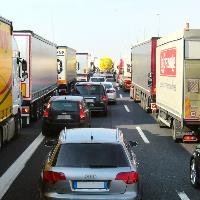(BRUSSELS) – As the coronavirus pandemic continues major disruption to European transport, the EU Commission issued new practical advice Monday on how to keep freight moving across the EU during the current crisis.
To ensure that EU-wide supply chains continue to operate, EU Member States are being requested to designate, without delay, all the relevant internal border-crossing points on the trans-European transport network (TEN-T) as ‘green lane’ border crossings.
The green lane border crossings should be open to all freight vehicles, says the EU executive, whatever goods they are carrying. Crossing the border, including any checks and health screening, should not take more than 15 minutes.
“Our guidance document is intended to protect the EU’s supply chains in these difficult circumstances, and to make sure both goods and transport workers are able to travel to wherever they are needed without delay,” said Transport Commissioner Adina Valean: “The green lanes are also specifically designed to protect transport workers at the frontline of this crisis. This set of recommendations will ease their already stressful mission and it will bring more safety and predictability to their work.”
Procedures at green lane border crossings should be minimised and streamlined to what is strictly necessary. Checks and screening should be carried out without drivers having to leave their vehicles, and drivers themselves should undergo only minimal checks. Drivers of freight vehicles should not be asked to produce any document other than their identification and driving license and if necessary a letter from the employer. The electronic submission/display of documents should be accepted.
No freight vehicle or driver should face discrimination, irrespective of origin and destination, the driver’s nationality or the vehicle’s country of registration.
In light of the current situation, the EU executive is also urging Member States to temporarily suspend all road access restrictions currently in place in their territory, such as weekend, night and sectoral bans.
The Commission encourages Member States to set up safe passage transit corridors to allow private drivers and their passengers, such as health and transport workers, as well as EU citizens being repatriated, regardless of their nationality, to directly pass with priority through the country in each necessary direction along the TEN-T Network. This should be done while staying strictly on the designated route and to take the necessary minimum rest breaks. Member States should ensure that they have at least one airport functional for repatriation and international relief flights.
The Commission has also set up a network of national contact points and a platform to provide information on national transport measures taken by Member States in response to the coronavirus. The national contact points should support the effective functioning of the green lane border crossing points. Neighbouring non-EU countries are invited to work closely with this network to ensure the flow of goods in all directions.
To keep transport moving, the Commission recommends that Member States take action to ensure the free movement of all workers involved in international transport, whatever the transport mode. In particular, rules such as travel restrictions, and mandatory quarantine of transport workers not displaying symptoms, should be waived. For example, Member States should not require that transport workers carry a doctor’s certificate to prove their good health. To ensure the safety of transport workers, enhanced hygiene and operational measures are also needed in airports, ports, railway stations and other land transport hubs. Today’s note from the Commission includes a full list of recommendations to protect drivers from the coronavirus (Annex 2).
Internationally recognised certificates of professional competence should be considered sufficient to prove that a worker is active in international transport. In the absence of such certificates (not all international drivers have one), a letter signed by the employer (Annex 3) should be accepted.
All of these principles should also apply to third country nationals if they are essential to ensuring that cargo moves freely within and into the EU.


